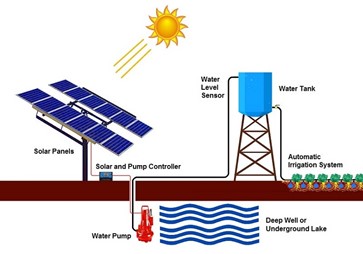
Enhancing Small holders’ resilience to CC through Use of Solar Powered Irrigation
NOVEMBER 11, 2021The food vulnerability
assessment due to Climate Change in Hai District by Lema et al., 2014 indicated
that severe droughts have dramatically affected agriculture production and food
security in the area. Climate change has exacerbated water stresses for
different socio-economic activities of most communities in Tanzania including Hai
District. It has disproportionately affected
traditional irrigation agriculture practices that utilize water from river
diversions or natural springs. Traditional irrigation has historically been a
major means of ensuring food security and income to the majority of farmers in
Hai DC. However, the situation has changed significantly in recent years
whereby farmers in the project areas are no longer able to rely on traditional
irrigation schemes except during the during rainy seasons only. This is largely
due to changes on rainfall patterns which has become and unreliable thereby making it impossible
for rivers and streams to flow continuously throughout the year to rain dependent
farming activities. Coupled with the geographical location of the project areas
which is characterized by low rainfall (i.e.,
< 700mm annually), the area has recently been experiencing prolonged dry spells,
leading to limited access to water for crops, livestock and human consumption. Using
limited and unreliable water from natural springs these poor smallholders’
farmers currently receives water twice a week for both irrigation and drinking
of their livestock, a situation which is significantly impeding their
development prospects. The changes have also caused recurrent crops failure and death of
livestock In turn, this situation has triggered fears of realizing most targets under the
sustainable development goals including food insecurity, famine, and
perpetuation of poverty, inequality and social conflicts among smallholder
farmers (e.g., especially between farmers and pastoralists).Intrigued by these
concerns and the inspiration of it’s Think and Do Tank philosophy, CAN Tanzania
is championing a 18-months project titled “Enhancing the role of Solar
Irrigation for Poverty Reduction in Hai District”. Funded by the Germany
government through the Federal Ministry for Economic Cooperation and
Development (BMZ), this project aims at enhancing the resilience of 1200 small
holder farmers households in the area against climate change. The project is
implemented in three villages of Ngosero,
Kilima Mbogo, and Mkombozi which are located in the dry lowland plains of the
southern part of Mt. Kilimanjaro.
By using
pro-poor, human-centered and participatory approaches, the project seeks to
overcome the pervasive challenges of poverty, food insecurity, gender
inequality and water use conflicts caused by the growing lack of access to
reliable and affordable water supply for irrigation purposes as compounded by
the population growth in the area as well as the growing impacts of climate
change. To ensure the project implementation aligns with local structures and
other circumstances in terms of needs and priorities, CAN Tanzania conducted
during the initiation phase a comprehensive socio-economic baseline and hydrogeological
studies in the target villages. The results of these studies have been
promising. They demonstrated the
villages have enough fertile land and ground water for both domestic and
commercial agricultural production.. Based on these findings, the project has
been designed to use reliable and affordable solar powered water pumps to
generate water for both irrigation and domestic use. On irrigation, the
generated water is expected to be sufficient for irrigation of 6000 acres of agricultural land. In addition
to boreholes, the project is also establishing charco dams to supplement
boreholes by harvesting rainwater from surface runoff during rainy season. Using an integrated and holistic approach, the
project is also addressing related challenges for these farmers including
training on modern farming and climate resilient techniques, bookkeeping and
financial management. The project is also encouraging farmers to make use of
digital platforms to access all key information such as markets and climate
services from various online sources such as the TMA farm SMS program.
Based on these interventions, it is expected that this project will transform these smallholders into a resilient and vibrant communities capable of coping with the present and projected shocks from climate change and other socio-economic and ecological stressors.
Solar Powered Irrigation Scheme Illustration, Photo Credit : Azure Bikes
